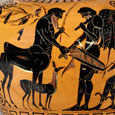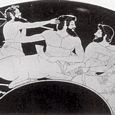PHOLOS
Greek Name
Φωλος
Transliteration
Phôlos
Latin Spelling
Pholus
Translation
Of the Cave (phôleos)
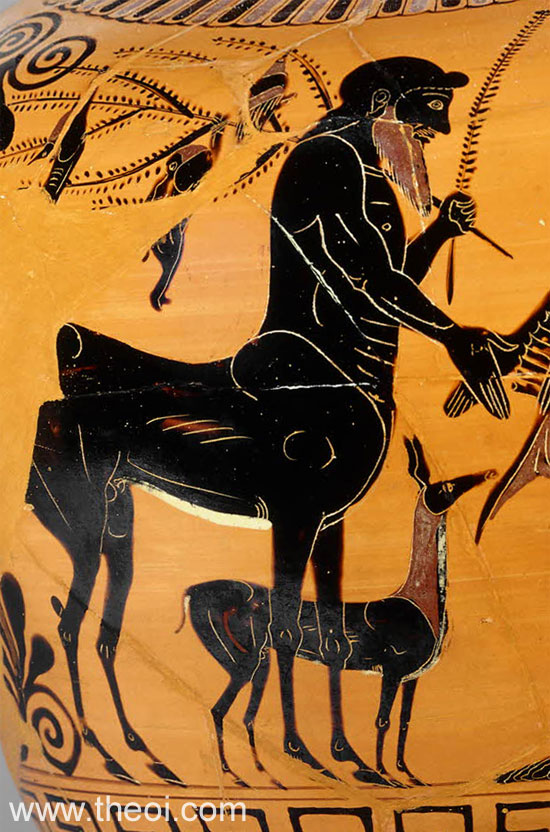
PHOLOS (Pholus) was an Arkadian Kentauros (Centaur) who made his home in a cave on Mount Pholoe. He once entertained Herakles who was passing through the region in search of the Erymanthian boar. But when Pholos opened his wine-skin to serve the hero the other Kentauroi (Centaurs), driven into a mad frenzy by the aroma, attacked. Herakles slew most of them with his arrows and the rest fled south. Pholos himself also suffered a mishap--for as he was examining the hero's poisoned-arrows he dropped one on his foot and died. The gods rewarded him for his show of hospitality by placing him amongst the stars as constellation Centaurus and his wine-cup as the adjacent Crater.
FAMILY OF PHOLUS
PARENTS
SEILENOS & MELIA (Apollodorus 2.83)
ENCYCLOPEDIA
PHOLUS (Pholos), a Centaur, a son of Seilenus and the nymph Melia, from whom Mount Pholoe, between Arcadia and Elis, was believed to have derived its name. (Apollod. ii. 5. § 4; Theocrit. vi. 149.)
Source: Dictionary of Greek and Roman Biography and Mythology.
CLASSICAL LITERATURE QUOTES
Pseudo-Apollodorus, Bibliotheca 2. 83 - 87 (trans. Aldrich) (Greek mythographer C2nd
A.D.) :
"[Herakles] passing through [Mount] Pholoe [in Arkadia (Arcadia)] was entertained by the Kentauros Pholos
(Centaur Pholus), a son of Seilenos (Silenus) by a Melias Nymphe (Melian Nymph). He set roast meat before
Herakles, while he himself ate his meat raw. When Herakles called for wine, he said he feared to open the jar
which belonged to the Kentauroi (Centaurs) in common. But Herakles, bidding him be of good courage, opened it,
and not long afterwards, scenting the smell, the Kentauroi arrived at the cave of Pholos, armed with rocks and
firs. The first who dared to enter, Ankhios (Anchius) and Agrios (Agrius), were repelled by Herakles with a
shower of brands, and the rest of them he shot and pursued as far as Malea. There they took refuge with Kheiron,
who, after the Lapithes (Lapiths) had driven him from Mount Pelion, settled on Malea. Thence they took refuge
with Kheiron (Chiron), who, driven by the Lapithes from Mount Pelion, took up his abode at Malea.
As the Kentauroi cowered about Kheiron, Herakles shot an arrow at them, which, passing through the arm of Elatos
(Elatus), stuck in the knee of Kheiron. Distressed at this, Herakles ran up to him, drew out the shaft, and
applied a medicine which Kheiron gave him. But the hurt proving incurable, Kheiron retired to the cave and there
he wished to die, but he could not, for he was immortal. However, Prometheus offered himself to Zeus to be
immortal in his stead, and so Kheiron died. [N.B. In other versions of this story Pholos was the one wounded by
the poison arrow.]
The remaining Kentauroi (Centaurs) fled this way and that, som to Mount Malea, Eurytion to Pholoe, Nessos to the
Euenus (Evenus) river. The rest were taken in at Eleusis by Poseidon, who hid them away on a mountain. As for
Pholos, as he was pulling an arrow out of a corpse, he marvelled that such a little object could destroy such
enormous adversaries. Just then it slipped from his hand, fell on his foot and instantly killed him. When
Herakles returned to Pholoe, he found Pholos dead, so he buried him and proceeded on to find the boar."
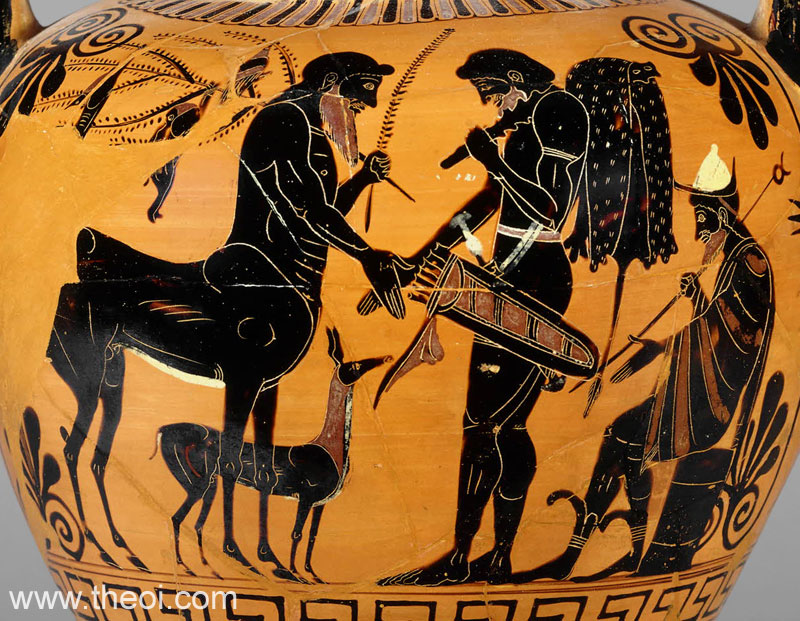
Theocritus, Idylls 6. 149 ff (trans. Rist) (Greek bucolic C3rd B.C.) :
"Was it in such a bowl that in Pholos' (Pholus') craggy cave the aged Kheiron (Chiron) placed before
Herakles?"
Diodorus Siculus, Library of History 4. 12. 3 (trans. Oldfather) (Greek historian
C1st B.C.) :
"About the time that Herakles was performing these Labours [i.e. the hunt of Erymanthian boar], there was a
struggle between him and the Kentauroi (Centaurs), as they are called, the reason being as follows. Pholos
(Pholus) was a Kentauros (Centaur), from whom the neighbouring mountain came to be called Pholoe, and received
Herakles with the courtesies due to a guest and opened for him a jar of wine which had been buried in the earth.
This jar, the writers of myths relate, had of old been left with a certain Kentauros by Dionysos, who had given
him orders only to open it when Herakles should come to that place.
And so, four generations after that time, when Herakles was being entertained as a guest, Pholos recalled the
orders of Dionysos.
Now when the jar had been opened the sweet odour of the wine, because of its great age and strength, came to the
Kentauroi dwelling near there, it came to pass that they were driven mad; consequently they rushed in a body to
the dwelling of Pholos and set about plundering him of the wine in a terrifying manner. At this Pholos hid
himself in fear, but Herakles, to their surprise, grappled with those who were employing violence. He had indeed
to struggle with beings who were gods on their mother's side, who possessed the swiftness of horses, who had the
strength of two bodies, and enjoyed in addition the experience and wisdom of men. The Kentauroi advanced upon
him, some with pine trees which they had plucked up together with the roots, others with great rocks, some of
with burning firebrands, and still others with axes such as are used to slaughter oxen. But he withstood them
without sign of fear and maintained a battle which was worthy of his former exploits. The Kentauroi were aided
in their struggle by Nephele (Cloud), who sent down a heavy rain, by which she gave no trouble to those which
had four legs, but for him who was supported upon two made the footing slippery. Despite all this Herakles
maintained an astonishing struggle with those who enjoyed such advantages as these, slew the larger part of
them, and forced the survivors to flee . . .
A peculiar thing also happened in the case of him who was called Pholos, the friend of Herakles. While he was
burying the fallen Kentauroi, since they were his kindred, and was extracting an arrow from one of them, he was
wounded by a barb, and since the wound could not be healed he came to his death. Herakles gave him a magnificent
funeral and buried him at the foot of the mountain, which serves better than a gravestone to preserve his glory;
for Pholoe makes known the identity of the buried man by bearing his name and no inscription is needed."
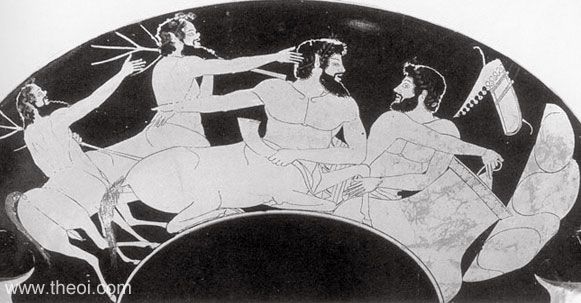
Pausanias, Description of Greece 3. 18. 10 - 16 (trans. Jones) (Greek travelogue C2nd
A.D.) :
"[Among the scenes depicted on the throne of Apollon at Amyklai (Amyclae) near Sparta :] There are also
reliefs of . . . the battle of the Kentauroi (Centaurs) at the cave of Pholos."
Quintus Smyrnaeus, Fall of Troy 6. 274 ff (trans. Way) (Greek epic C4th A.D.)
:
"[Amongst the scenes depicted on the shield of Herakles' grandson Eurypylos :] Stormed the wild rout of the
Kentauroi (Centaurs) round the hall of Pholos (Pholus): goaded on by Eris (Strife) and wine, with Herakles the
monsters fought."
Pseudo-Hyginus, Astronomica 2. 38 (trans. Grant) (Roman mythographer C2nd A.D.)
:
"[N.B. Chiron replaces Pholus in this version of the myth.] [Constellation] Centaurus . . . When Hercules
was once visiting Chiron, and while sitting with him was examining his arrows, one of them is said to have
fallen on the foot of Chiron, and thus brought about his death. Others say that when the Centaurus wondered at
his being able to kill such huge creatures as Centauri (Centaurs) with such slight arrows, he himself tried to
draw the bow, and the arrow, slipping from his hand, fell on his foot.
For this reason Jupiter [Zeus], pitying him, put him among the constellations with a victim which he seems to
hold above the altar for sacrifice. Others have sais that he is Pholus the Centaurus, who was more skilled in
augury that the rest. Consequently, by the will of Jove [Zeus], he was represented coming to the altar with a
victim."
Statius, Thebaid 2. 563 ff (trans. Mozley) (Roman epic C1st A.D.) :
"Great-hearted Pholus lifted the empty mixing-bowl against his Lapith foes."
Nonnus, Dionysiaca 14. 49 ff (trans. Rouse) (Greek epic C5th A.D.) :
"[Rhea summoned rustic divinities to join the army of Dionysos for his campaign against the Indians :]
After them came also the gentle tribe of twiform Kentauroi (Centaurs). Beside Pholos (Pholus) in horse's form
was Kheiron (Chiron), himself of that strange nature, untamed, with mouth unbridled."
ANCIENT GREEK ART
SOURCES
GREEK
- Apollodorus, The Library - Greek Mythography C2nd A.D.
- Theocritus, Idylls - Greek Idyllic C3rd B.C.
- Diodorus Siculus, The Library of History - Greek History C1st B.C.
- Pausanias, Description of Greece - Greek Travelogue C2nd A.D.
- Quintus Smyrnaeus, Fall of Troy - Greek Epic C4th A.D.
- Nonnus, Dionysiaca - Greek Epic C5th A.D.
ROMAN
- Hyginus, Astronomica - Latin Mythography C2nd A.D.
- Statius, Thebaid - Latin Epic C1st A.D.
BIBLIOGRAPHY
A complete bibliography of the translations quoted on this page.
